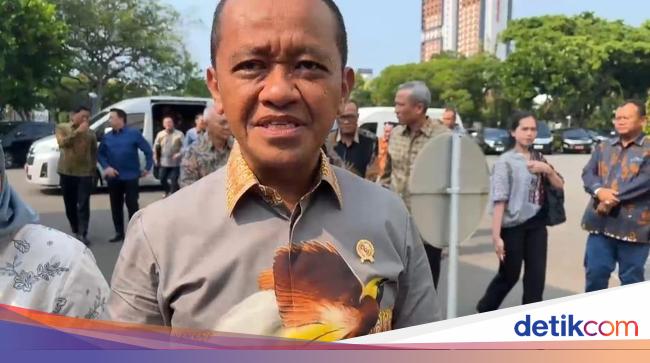Jakarta –
Minister of Energy and Mineral Resources (ESDM) Bahlil Lahadalia announced the criteria for recipients of the latest fuel oil scheme (BBM). The government plans to use two subsidized fuel distribution schemes, namely the cargo scheme and Tunia Direct Assistance (BLT).
Bahlil said he would use single data for recipients of fuel subsidies under the BLT scheme. This data was collected from various data on subsidy recipients from ministries/institutions (K/L). Later, it will be coordinated by the Central Bureau of Statistics (BPS).
“The data is certain, this is integrated data, between data from the Ministry of Social Affairs, data from Bappenas, data from PLN, data from Pertamina, data from the Ministry of Coordination, PMK, together in one, then harmonized with BPS,” said Bahlil when met at his residence, Pancoran, Jakarta, on Wednesday (27/11/2024).
SEVENTEEN
CHECK TO CONTINUE WITH INDEX
Bahlil explained that this single data was an instruction from President Prabowo Subianto. Because of this, until now the distribution of fuel subsidies has never used single data.
As for the number of recipients, Bahlil was willing to show it. He only emphasized that the total number of recipients of BLT fuel subsidies was not much different from data from the Ministry of Social Affairs (Kemensos).
“I don’t think it will go far with the data of the Ministry of Social Affairs. It won’t be far from that. How far it will go down or how much it will go up is another matter. But it is not there still,” Bahlil explained.
For the freight subsidy scheme, Bahlil said vehicles with yellow plates are one of the vehicles eligible to receive it. He believes that this effort is one way to prevent public transport fares from increasing.
“One of them is that the vehicles with yellow plates are the ones that are eligible for subsidy. Angkot, transport, so what? The price of transport cannot be increased. The price of transport cannot be increased,” said Bahlil.
(clay/clay)
2024-11-27 05:24:00
#Fuel #subsidies #scheme
Considering the potential impact on diverse stakeholders within the transport sector, what measures can be implemented to ensure the sustainability and avoid unintended consequences of the freight subsidy scheme?
## Interview: Fuel Subsidy Schemes in Indonesia
**Introduction:**
Welcome to World Today News. Today, we’re diving deep into the recent announcement regarding Indonesia’s new fuel subsidy schemes. Joining us are two experts: [Guest 1 Name], an economist specializing in energy policy, and [Guest 2 Name], a sociologist focusing on social welfare programs. Thank you both for being here.
**Section 1: Data Integration and Recipient Selection**
* **Interviewer:** Minister Lahadalia mentioned the use of single data for BLT fuel subsidy recipients, integrating data from various government institutions.
Can you elaborate on the potential benefits and challenges of using such a system? How can we ensure accuracy and prevent errors in identifying eligible recipients?
* **Guest 1:** (Perspectives from an economist’s standpoint)
* **Guest 2:** (Perspectives on social welfare program implementation)
**Section 2: Transparency and Public Perception**
* **Interviewer:** The Minister has stated that the number of BLT recipients won’t deviate significantly from the Ministry of Social Affairs’ data.
What are your thoughts on the level of transparency communicated so far? How can the government build trust and address potential concerns regarding the selection criteria and the distribution process?
* **Guest 1:** (Focus on economic transparency and accountability)
* **Guest 2:** (Focus on public perception and potential social impact)
**Section 3: Targeting the Freight Subsidy Scheme**
* **Interviewer:** The freight subsidy scheme will target yellow-plated vehicles, including public transportation.
What is your assessment of this approach? How will it impact different stakeholders within the transport sector, and what potential unintended consequences should we be aware of?
* **Guest 1:** (Analysis from an economic perspective, considering potential market distortions)
* **Guest 2:** (Examination of the social implications and potential equity concerns)
**Section 4: The Broader Context: Fuel Subsidies and National Development**
* **Interviewer:**
Fuel subsidies are a complex issue with ongoing debates globally. How do you view Indonesia’s approach within this broader context? What are the long-term implications of this specific fuel subsidy scheme for the Indonesian economy and society?
* **Guest 1:** (Macroeconomic perspective and potential impact on national development)
* **Guest 2:** (Sociological perspective and the interplay between social welfare, economic development, and fuel subsidies)
**Conclusion:**
Thank you both for sharing your insightful perspectives. This new fuel subsidy scheme represents a significant development in Indonesia. We hope this discussion has shed light on
the complexities involved and the potential implications for all stakeholders.


